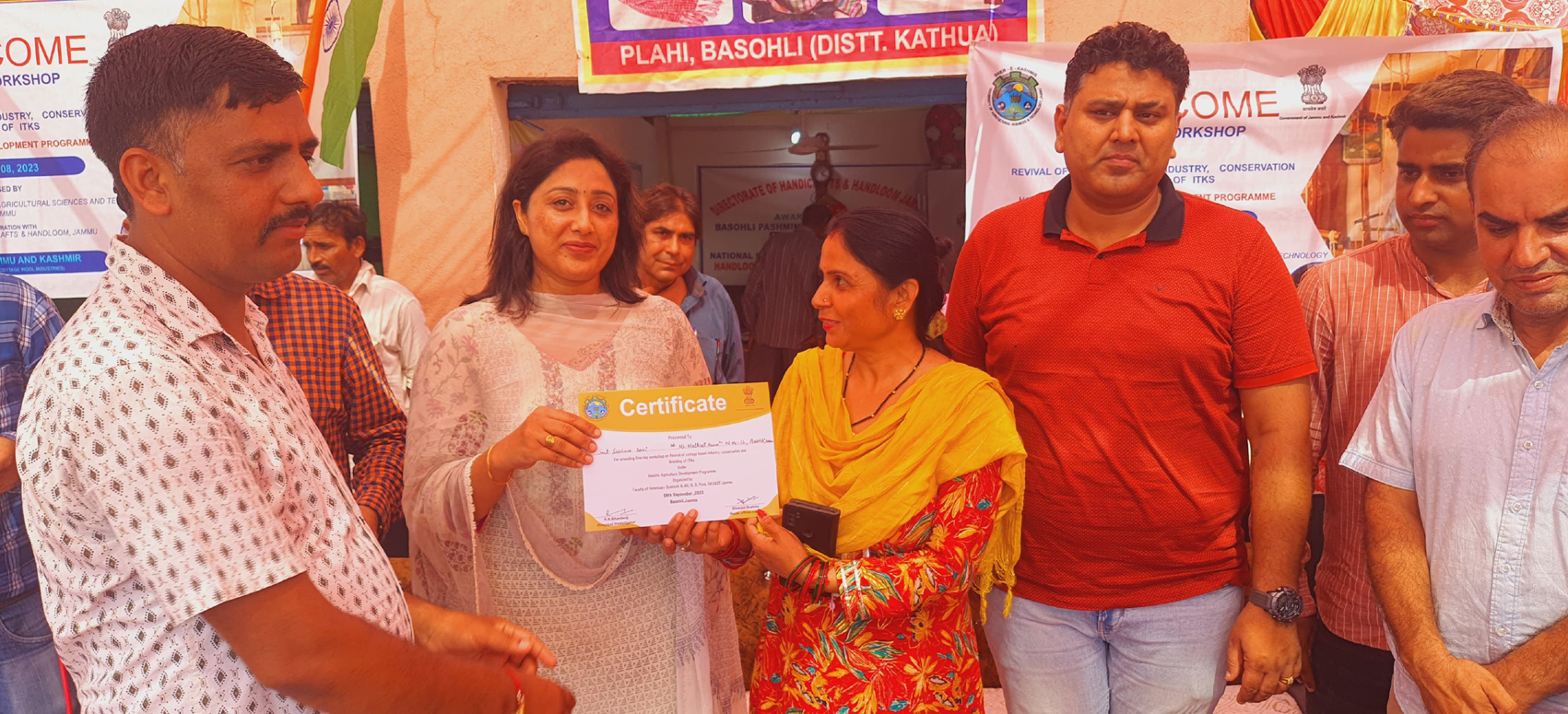| SKUAST-J, Directorate of Handicrafts, Handloom collaborate to boost cottage industries in Basohli | | |  Early Times Report Early Times Report
JAMMU, Sept 9: In a concerted effort to revitalize cottage-based industries and preserve Indigenous Traditional Knowledge (ITK), a one-day workshop was held on September 8, 2023, in Basohli, Kathua, Jammu. This significant event, titled "Revival of Cottage Based Industry, Conservation and Branding of ITKs," was organized under the Holistic Agriculture Development Programme (HADP) with the esteemed guidance of Prof. (Dr.) B. N. Tripathi, Honorable Vice Chancellor of SKUAST-Jammu, and Prof. (Dr.) M. S. Bhadwal, Dean F.V.Sc. & A.H. of SKUAST-Jammu.
Megha Baogia, Deputy Director Planning of Handicrafts and Handloom, graced the workshop as the chief guest, shedding light on the crucial role of cottage-based industries in driving economic growth and holistic development in the Union Territory of Jammu and Kashmir.
Dr. R. K. Bhardwaj, PI HADP, welcomed the chief guest, along with resource persons Tanuj Dogra, an expert in designing, and Mr. Sham Lal, President of the weaver's society. Dr. Bhardwaj provided an insightful overview of the workshop, stressing the significance of brand development, product authentication, modernization of machinery, technological advancements, and the necessity for common infrastructure development to empower ITK practitioners in Basohli. He expressed gratitude to the Directorate of Handicrafts and Handloom, Jammu, and his project team, Dr. Zuhaib Bhat and Dr. Vikas Mahajan, for their pivotal role in organizing the event.
During the workshop, Tanuj Dogra delivered a comprehensive lecture on the pivotal role of design and dyeing in enhancing the value of shawls and wool-based products. Sham Lal shed light on the pashmina sector in Basohli and outlined the challenges hindering its growth.
This was followed by a dynamic interaction between the experts and the artisans, aiming to grasp the fundamental challenges faced by weavers and traditional artisans in their field. Artisans emphasized the issue of low returns due to outdated charkhas and looms, and they requested immediate support for industry revival, especially through the provision of modern tools, including fast-spinning pedal-operated charkhas and looms.
Several proposals emerged during the discussion. Artisans underscored the need for establishing a testing lab specifically for Basohli pashmina shawls. Such a lab would authenticate products, maintain quality standards, and prevent duplication. Furthermore, weavers called for training programs focused on design and the creation of fine wool shawls.
A significant concern raised was the scarcity of pashmina in the region, resulting in irregular weaving and income for weavers. To mitigate this, artisans proposed an annual government-arranged procurement of pashmina from Ladakh, tailored to the local demand, ensuring stability in the industry.
Dr. Vikas Mahajan, Co-PI of HADP, expressed heartfelt gratitude to the chief guest, speakers, and, most importantly, the artisans for their active participation, contributing to the successful completion of the workshop. This collaborative endeavor between SKUAST-Jammu and the Directorate of Handicrafts and Handloom marks a significant step towards rejuvenating and preserving the rich heritage of cottage-based industries in Basohli, Jammu, paving the way for the holistic development of the region's artisans and their invaluable crafts. |
|
